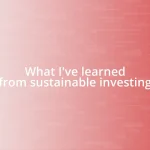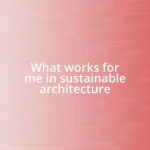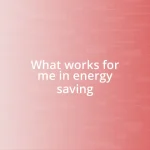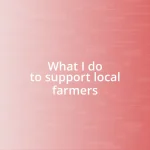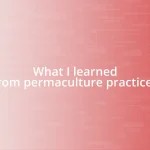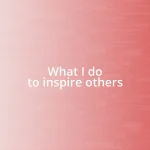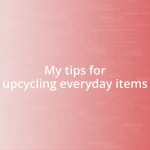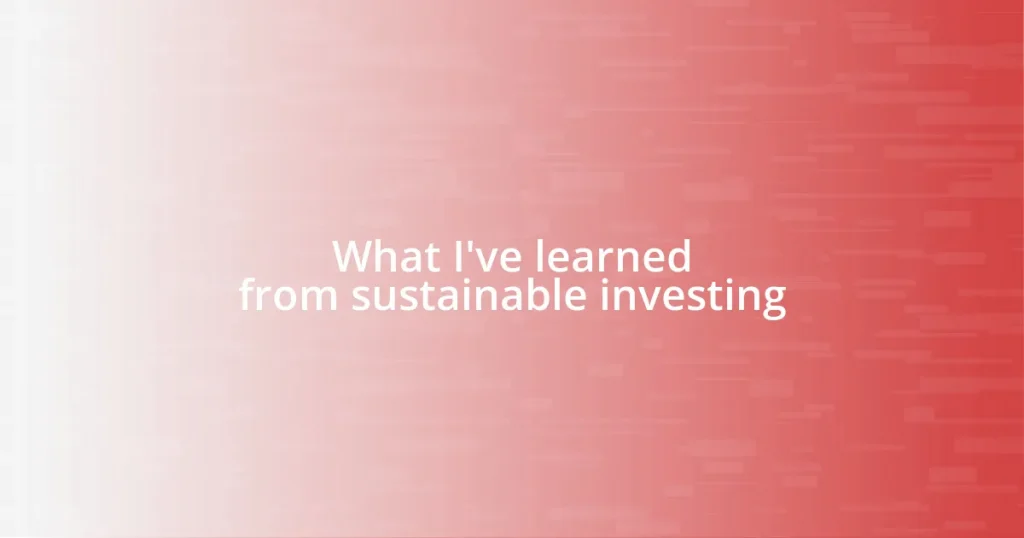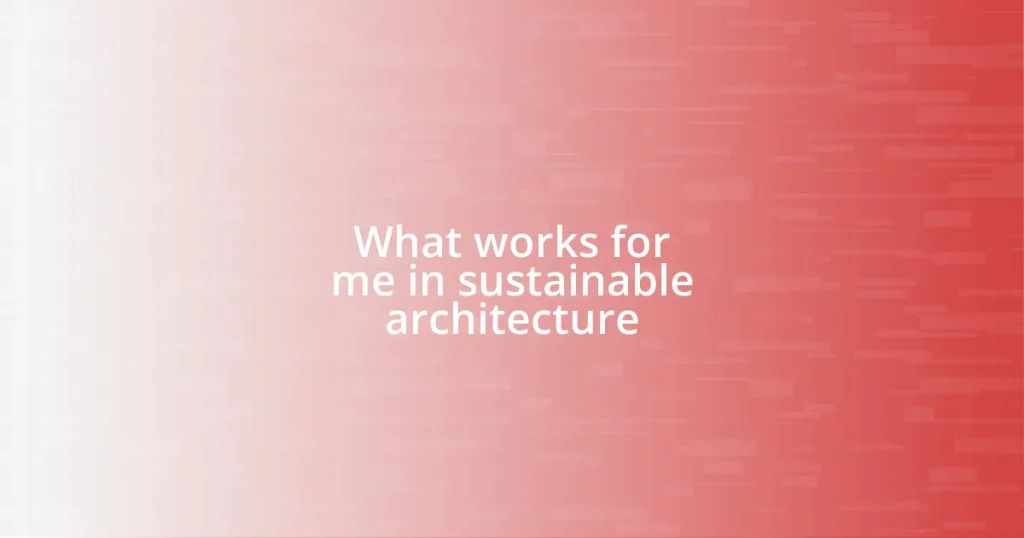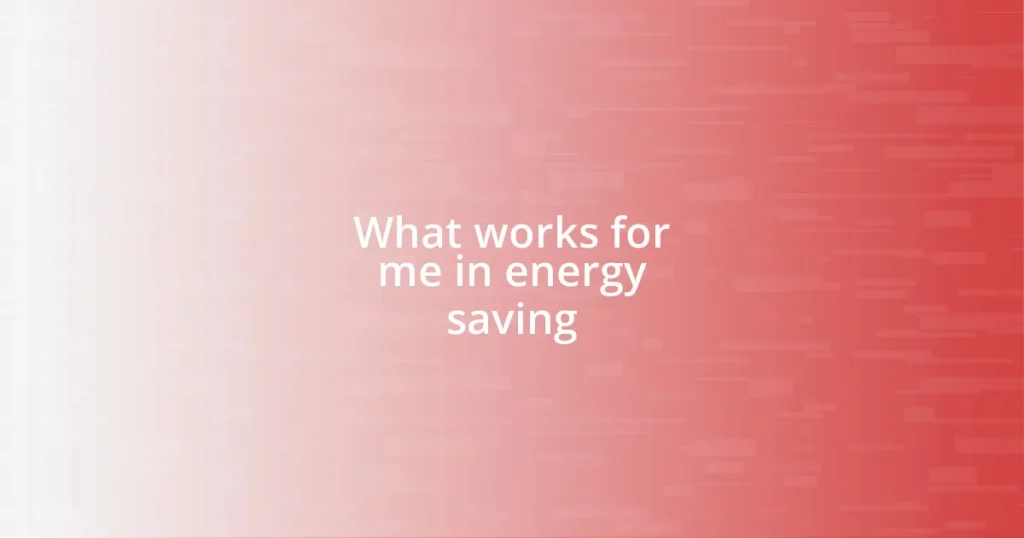Key takeaways:
- Off-grid living fosters a profound connection to nature, offering peace and opportunities for personal growth.
- Key benefits include energy independence through solar power, which encourages resource management and community collaboration.
- Proper planning for an off-grid homestead emphasizes sustainable practices like water management, food production, and energy generation.
- Maintaining sustainability involves ongoing learning, adaptation, and mindful choices, from composting to energy conservation.

Introduction to Off-Grid Living
Imagine waking up to the sounds of nature instead of the blaring alarm of a traditional morning. Off-grid living allows you to embrace this lifestyle by disconnecting from the conventional utilities that our modern world relies on. It’s about being self-sufficient, cultivating a deep connection with nature, and experiencing a sense of freedom that can be hard to find in urban environments.
Reflecting back on my first sunrise in a cabin I built myself, I felt a rush of gratitude for the simplicity and beauty surrounding me. I remember standing on the porch, sipping my coffee, and taking in the expansive sky, thinking, is this what true peace feels like? Transitioning to an off-grid lifestyle isn’t just about reducing energy bills or going green; it’s about enriching your life and embracing challenges that encourage personal growth.
Living off-grid can seem daunting at first. Questions arise: How do I provide for my basic needs? What about heat and water? These fears can feel overwhelming, but I learned that each question is an opportunity to innovate and adapt. For me, it became a journey of discovery, and I wouldn’t trade the lessons learned along the way for anything. Each challenge strengthened my resolve and informed my perspective on what truly matters in life.

Understanding Off-Grid Lifestyle Benefits
Living off-grid offers numerous benefits that deeply resonate with those seeking a simpler existence. For me, one of the most significant advantages had been the profound connection to nature. I recall a summer evening when the sky exploded into brilliant colors as the sun set, and I realized that moments like these were much more fulfilling than any fancy city dinner. Each sunset became an opportunity to reflect on my day, providing a meditative space I had never experienced before.
Another noticeable benefit is the control I gained over my energy consumption. I remember the thrill of harnessing solar power; it was empowering to watch the light bulbs brighten with the sun’s energy—I had become my own power supplier! This journey into self-sufficiency allows for creativity in how I manage resources. By carefully monitoring what I used, I learned to appreciate and value every drop of water and every watt of energy. This awareness extends beyond mere consumption; it transformed my appreciation for what our planet provides.
Lastly, I found that off-grid living fosters a strong sense of community and collaboration. My neighbors were quick to band together for communal projects, such as building fences or sharing harvests. I remember organizing a small potluck with freshly picked vegetables from our gardens, realizing that these connections were as nourishing as the food itself. This lifestyle promotes not just independence but interdependence, reinforcing the idea that we thrive best when we support one another.
| Benefit | Personal Experience |
|---|---|
| Connection to Nature | Witnessing stunning sunsets and enjoying peaceful mornings |
| Energy Independence | Harnessing solar power and managing resources creatively |
| Community Engagement | Building relationships through shared projects and potlucks |

Planning Your Off-Grid Homestead
Planning your off-grid homestead is an exciting endeavor that requires thoughtful consideration. I remember sitting at my kitchen table, sketches and notes spread out, trying to envision not just my space but the lifestyle I wanted to cultivate. Each element—from the layout of my garden to the placement of my solar panels—was a building block of a harmonious life. It was exhilarating to think about how everything could work together seamlessly, creating a self-sufficient sanctuary.
Here are some key considerations to keep in mind during your planning:
- Location: Assess the land for natural resources such as water supply and sunlight exposure for solar energy.
- Design: Think about how your home will flow with nature; I opted for large windows to bring in natural light and offer breathtaking views of the trees.
- Energy Needs: Plan for sustainable energy sources; researching different systems, I ultimately chose a combination of solar and wind power to diversify my energy generation.
- Water Management: Consider rainwater harvesting and filtration systems; having access to clean water is crucial, and I learned to appreciate every drop collected.
- Food Production: Design a space for growing your own food; starting small made the journey feel manageable, like my first vegetable plot that offered a great harvest for a beginner.
By focusing on each of these elements, I found myself building not just a home but a lifestyle that truly resonated with who I wanted to be.

Essential Resources for Off-Grid Living
When it comes to essential resources for off-grid living, water is undeniably at the top of the list. I vividly remember the initial challenges I faced in ensuring a reliable water supply. Collecting rainwater became a vital routine, and setting up my first rain barrel felt like a small victory. Each time I poured water into my garden, it felt deeply satisfying to know I was using a natural resource while contributing to a self-sustaining lifestyle. How incredible is it that something as simple as rain can nourish both my plants and my spirit?
Next on the list would have to be energy resources, particularly solar power. I can’t help but smile when I think about assembling my solar panels for the first time with a friend who was equally excited. The sense of accomplishment we shared was palpable—each panel felt like a step toward independence. Watching my energy meter run backwards on a sunny day brought an indescribable joy; it made me realize how much potential lay in harnessing the sun’s energy. For anyone considering this lifestyle, I often ask: wouldn’t you love to generate your own power and take charge of your energy consumption?
Finally, food resources are essential, and the experience of growing my first vegetable garden was transformative. I remember anxiously waiting for my seedlings to sprout, feeling a thrill with each tiny green shoot. There’s a profound sense of pride that comes from cooking meals with ingredients you’ve nurtured from seed to harvest. It feels rewarding not just in terms of sustenance, but also in fostering a deeper connection with nature. So, what if the food on your plate came from just steps away? That notion alone makes off-grid living incredibly appealing.

Building an Off-Grid Energy System
Building an off-grid energy system can feel daunting at first, but it’s all about taking it step by step. I remember standing in my backyard, surrounded by stacks of solar panels, feeling both excited and a little overwhelmed. My buddy and I tackled the installation together, and it was inspiring to see how each panel was not just a piece of technology but also an investment in our future independence. With every connector clicked into place, I couldn’t help but think about how this system would change our lives.
After installing the solar panels, I quickly realized that energy storage was crucial for my energy setup. That’s when I decided to invest in batteries—specifically deep cycle batteries for their longevity. I can still picture the moment I laid everything out in my battery shed, carefully labeling each connection. It felt like I was creating my own little powerhouse! This attention to detail allowed me to store energy for those rainy days when the sun didn’t shine. Can you imagine the peace of mind knowing you have backup power ready to go?
Finally, I embraced the idea of incorporating wind energy into my setup. After doing some research and chatting with a few seasoned off-gridders, I decided to install a small wind turbine on my property. The first time I saw the blades spinning, I felt a rush of joy. It was like watching my independence come to life! The combination of solar and wind has provided a stable energy flow, and there’s a wonderful satisfaction in knowing that I’m truly living off the land. Have you ever experienced the thrill of generating your own energy? It’s a feeling that’s hard to describe but deeply fulfilling.

Managing Water Supply Off-Grid
Managing your water supply off-grid requires a thoughtful approach to not only collection but also conservation. When I first started this journey, I realized that every drop counts. I set up a simple but effective rainwater collection system using barrels positioned under the eaves of my house. Watching those barrels fill up during a heavy rain was like witnessing the blessing of nature, and it taught me the value of being resourceful in times of abundance.
I also learned quickly that filtration is essential for making rainwater safe to drink. My first experience with a DIY filtration system involved layering gravel, sand, and charcoal in a large bucket. It was both a trial and error process, but each time I drank that clear, filtered water, I felt an incredible sense of accomplishment. Have you ever felt the satisfaction of knowing exactly where your water came from, from collection to filtration? It’s an empowering experience that reinforces your connection to the environment.
Another aspect I had to manage was finding ways to conserve the precious water I had. I installed low-flow fixtures and embraced gray water recycling by using water from washing vegetables to nourish my garden. It was enlightening to see how small changes could make such a significant impact. The day I realized that I had saved enough water to ensure my plants thrived during a dry spell was eye-opening. Doesn’t it feel great to know you’re doing your part to protect our planet while living sustainably? That’s the kind of fulfillment that comes with off-grid living.

Maintaining Sustainability and Self-Sufficiency
Maintaining sustainability and self-sufficiency is a journey of continuous learning and adaptation. I fondly remember my first attempt at growing food in my off-grid garden. The thrill of seeing tiny seedlings sprouting was overshadowed by anxiety about whether I’d be able to produce enough to nourish my family. Over time, however, I learned to embrace natural pest management and crop rotation, and this experience taught me that nature has its ways of balancing itself out. Have you ever felt the satisfaction of harvesting your first homegrown vegetable? It’s a delightful reminder of how self-sufficiency is truly intertwined with respect for the land.
To deepen my commitment to sustainability, I turned to composting, and I can’t emphasize enough how transformative it has been. Initially, I was hesitant, thinking it would be an unpleasant task, but my perspective shifted after I set up a simple compost bin behind my kitchen. Watching kitchen scraps turn into rich, usable soil felt almost magical. I’d often find myself peering into the bin, marveling at the change taking place, and questioning how something once deemed waste could be so valuable. This process not only helped reduce my waste but also strengthened my bond with the earth, reinforcing my off-grid lifestyle’s essence.
Energy conservation emerged as another essential aspect of my sustainability efforts. I vividly remember replacing traditional lighting with LED bulbs. The immediate lower energy consumption felt like a small victory, but what really struck me was the realization of how mindful choices can lead to considerable long-term impacts. I began questioning my habits—did I really need to leave lights on in unused rooms? This shift towards mindfulness has encouraged me to constantly evaluate how I use energy, revealing that sustainability is about making conscious decisions daily. Isn’t it amazing how small adjustments can ripple out and create a more self-sufficient lifestyle?
